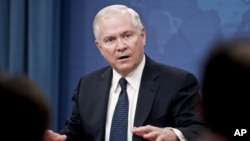U.S. Defense Secretary Robert Gates on Thursday established new regulations that make it more difficult to expel someone from the U.S. military for being a homosexual. The move is a partial step toward President Barack Obama's desire to end the ban on open homosexuals serving in the military.
Secretary Gates says the new regulation is designed to make it more difficult for someone to maliciously provide information that results in a servicemember being discharged for homosexuality.
"These changes reflect some of the insights we have gained over 17 years of implementing the current law, including the need for consistence, oversight and clear standards," he said.
For centuries, homosexuals were banned from the U.S. military. But under the current "Don't Ask, Don't Tell" law, passed in 1993, homosexuals may serve in the U.S. military, if they keep their sexual orientation a secret. If servicemembers acknowledge their homosexuality, or someone else provides information about it, they are discharged.
The new regulation still implements that law, but information in such cases will face a tougher test regarding its credibility - including the requirement that people providing information do so under oath, and that their reliability be evaluated. In addition, some types of information will now be excluded from such cases, including statements made to doctors, nurses, psychotherapists, lawyers and members of the clergy. The rules also require that a general or admiral review the evidence and make the final decision in cases against enlisted troops.
Secretary Gates calls it "common sense." "I believe these changes represent an important improvement in the way the current law is put into practice, above all by providing a greater measure of common sense and common decency to a process for handling what are difficult and complex issues for all involved," he said.
Gates says the new regulation takes effect immediately, and will affect cases currently under investigation.
According to Defense Department figures, since 1997, an average of more than 800 people per year have been discharged from the U.S. military for homosexuality, although the numbers have been down recently. Officials could not say how the number of discharges will change under the new rules.
President Obama has said he wants the Congress to change the law this year, to allow homosexuals to serve openly in the U.S. military. Secretary Gates has launched a study of the effect of such a move - a process senior military officers have endorsed. But some officers have also expressed concern about the impact of such a change on military readiness during a time of war.
One senior officer recently went further. Lieutenant General Benjamin Mixon, a former regional commander in Iraq who now heads U.S. Army forces in the Pacific, wrote a letter , published in the military newspaper Stars and Stripes, calling the planned change "ill advised," and calling on servicemembers who agree with him to make their views known.
On Thursday, the top U.S. military officer, Admiral Michael Mullen, who supports the plan to change the law, issued a sharp rebuke for what he said was inappropriate public opposition to a presidential policy by a senior officer.
"In the end, if there is either policy [or] direction that someone in uniform disagrees with, and I've said this before, and you feel so strongly about it, the answer is not advocacy, it is in fact to vote with your feet [resign or retire from the military]," he said.
Admiral Mullen essentially suggested that Lieutenant General Mixon consider resigning, and said the Army Chief of Staff has spoken to Mixon about his behavior. Secretary Gates also called Mixon's letter inappropriate, and said he has the same view about public opposition by a senior officer to any presidential policy decision.
Pentagon Makes it Harder to Expel Homosexuals from US Military









